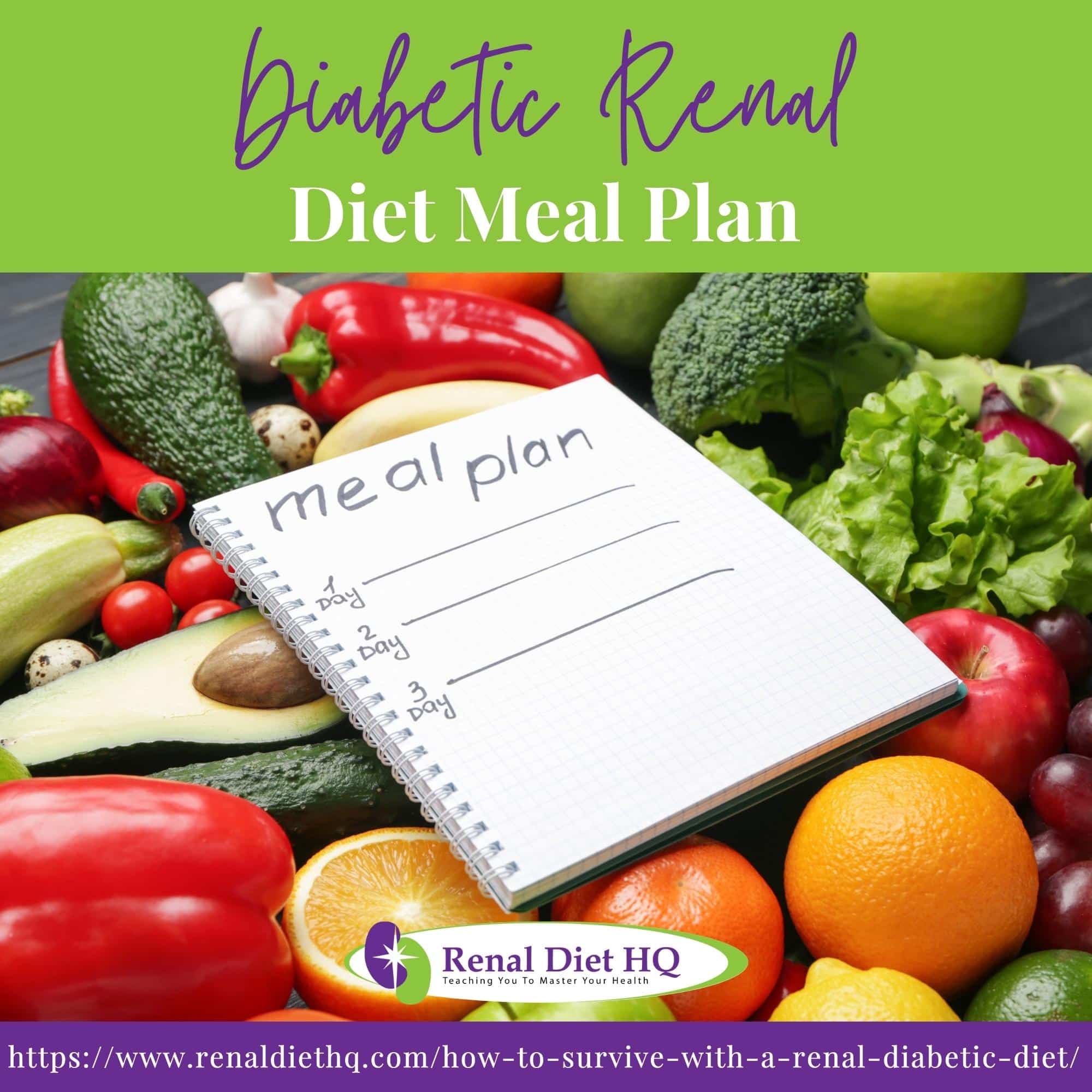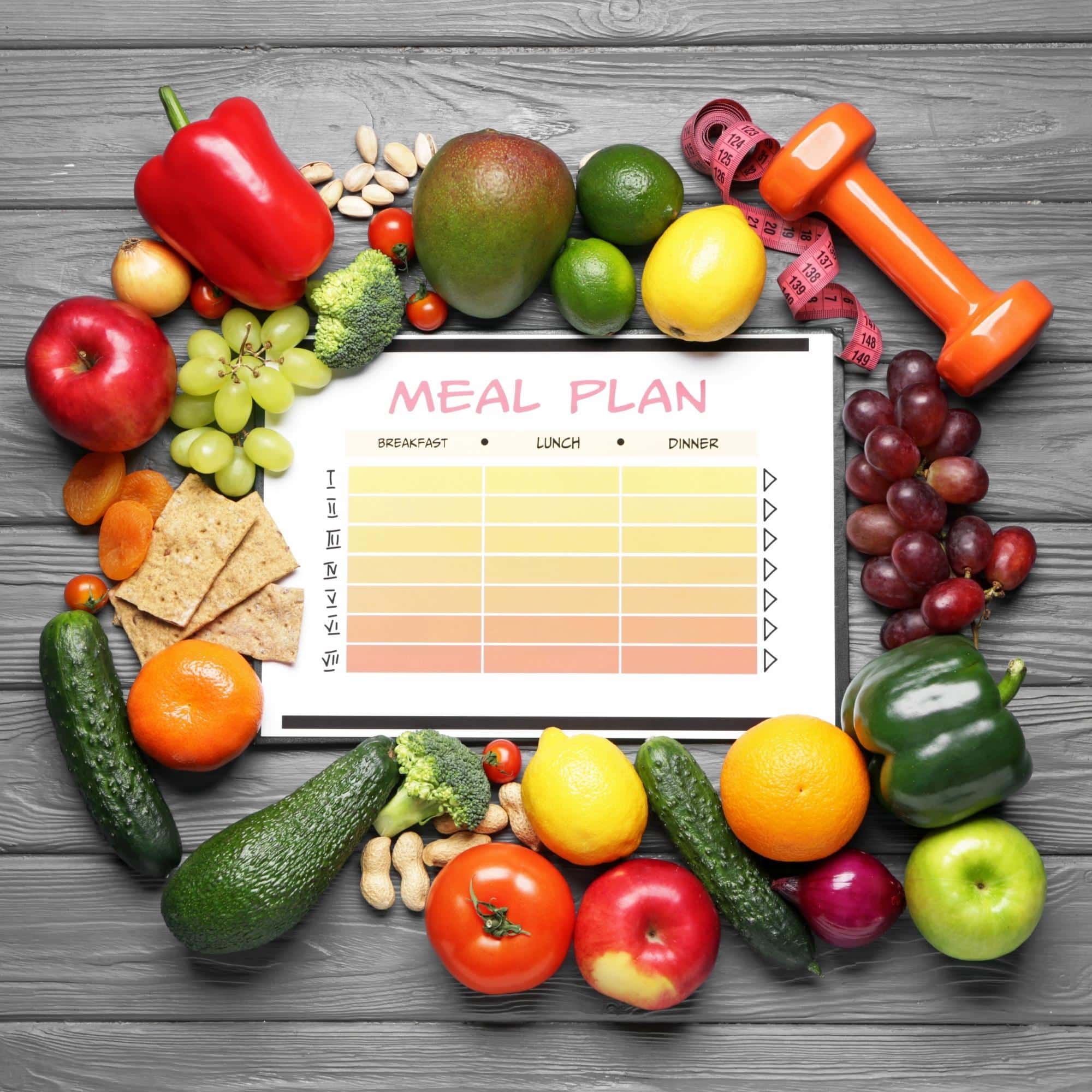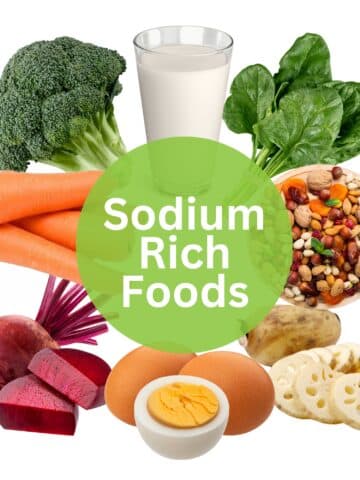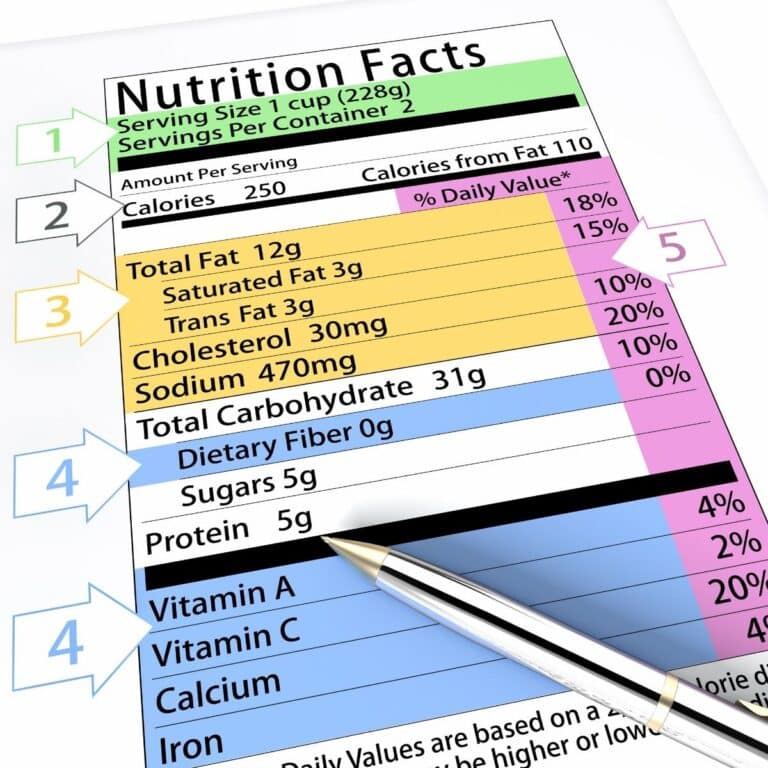Diabetic Renal Diet Meal Plan
Managing both kidney disease and diabetes can be challenging, but a diabetic renal diet meal plan can help individuals effectively navigate these conditions. This comprehensive food plan focuses on controlling carbohydrate intake, balancing protein levels, and practicing portion control.
By making informed food choices and adapting one's lifestyle, individuals can maintain their health and well-being. In this article, we will explore the importance of a diabetic renal diet, the impact of carbohydrates and protein on kidney health (kidney friendly meal plan), as well as practical tips for incorporating this meal plan into your daily routine.

Key Takeaways
- Carbohydrate intake affects diabetes control, so it is important to limit processed grains and opt for whole grains.
- Fiber is beneficial and does not raise blood sugar levels, making it a good choice for a renal diabetic diet.
- Portion control is important, especially with high-carb foods, to manage both diabetes and kidney problems.
- Protein intake needs to be controlled with kidney disease, as the kidneys are sensitive to protein. The amount of protein may need to be adjusted depending on the stage of kidney disease.
Jump to:
- Key Takeaways
- Free 7-Day Meal Plan for Kidney Disease and Diabetes
- Understanding the Link Between Diabetes and Kidney Disease
- Diabetic Renal Diet Meal Plan
- The Role of Carbohydrates in a Diabetic Renal Diet
- The Impact of Protein on Kidney Health
- Choosing the Right Foods for Your Diabetic Renal Diet
- The Importance of Portion Control in a Diabetic Renal Diet
- Navigating Dining Out on a Diabetic Renal Diet
- The Role of Hydration in a Diabetic Renal Diet
- FAQs for How to Survive with a Renal Diabetic Diet
- A Personalized Diabetic Renal Diet Helps Take Control Of Your Health
For More Recipes and Ideas --->> Get Your Free Meals and Recipes That Are Perfect for Pre-Dialysis Diets, Pre-Dialysis with Diabetes, or Dialysis Diets.
Free 7-Day Meal Plan for Kidney Disease and Diabetes
Managing both kidney disease and diabetes requires careful planning to maintain balanced nutrition, control blood sugar levels, and protect kidney function. Here’s a 7-day meal plan designed to help you achieve these goals.
Day 1-3
Day 1
- Breakfast: Scrambled eggs with spinach, whole-grain toast.
- Lunch: Grilled chicken salad with mixed greens, low-sodium dressing.
- Dinner: Baked salmon, quinoa, steamed broccoli.
- Snack: Apple slices with almond butter.
Day 2
- Breakfast: Greek yogurt with berries and chia seeds.
- Lunch: Turkey and avocado wrap with whole-grain tortilla.
- Dinner: Stir-fried tofu with mixed vegetables, brown rice.
- Snack: Carrot sticks with hummus.
Day 3
- Breakfast: Oatmeal with cinnamon and sliced bananas.
- Lunch: Quinoa salad with chickpeas, cucumber, and lemon dressing.
- Dinner: Grilled shrimp, asparagus, sweet potato.
- Snack: Cottage cheese with pineapple chunks.
Day 4-7
Day 4
- Breakfast: Smoothie with spinach, berries, and unsweetened almond milk.
- Lunch: Lentil soup with a side of whole-grain bread.
- Dinner: Baked chicken breast, roasted Brussels sprouts, wild rice.
- Snack: Mixed nuts.
Day 5
- Breakfast: Whole-grain English muffin with peanut butter.
- Lunch: Spinach and feta stuffed bell peppers.
- Dinner: Cod fillet, mashed cauliflower, green beans.
- Snack: Pear slices with cheese.
Day 6
- Breakfast: Chia pudding with fresh fruit.
- Lunch: Grilled vegetable wrap with hummus.
- Dinner: Beef stir-fry with bell peppers and brown rice.
- Snack: Greek yogurt with a handful of nuts.
Day 7
- Breakfast: Avocado toast on whole-grain bread.
- Lunch: Chicken Caesar salad with low-sodium dressing.
- Dinner: Turkey meatballs, zucchini noodles, marinara sauce.
- Snack: Fresh berries.
Tips for Meal Planning
- Portion Control: Ensure balanced portions to manage blood sugar and protect kidney function.
- Meal Prep: Plan and prepare meals in advance to simplify adherence to dietary guidelines.
- Consult a Dietitian: Regularly consult with a dietitian to tailor the meal plan to your specific needs.
A structured meal plan can significantly improve your ability to manage kidney disease and diabetes. By following this 7-day plan, you can ensure that your diet is both nutritious and supportive of your health goals.
Understanding the Link Between Diabetes and Kidney Disease
Diabetes and kidney disease often go hand in hand, with diabetes being one of the leading causes of kidney damage. To effectively manage both conditions, it is crucial to monitor and control blood sugar levels through medication (ckd and diabetes medications), diet, and lifestyle changes.
Early detection of kidney disease is key in preventing further damage and complications, making regular screenings and check-ups essential for individuals with diabetes.
Diabetes and Kidney Damage
Diabetic kidney disease (DKD), also known as diabetic nephropathy, is a serious complication of diabetes mellitus that affects the kidneys.
It is a leading cause of chronic kidney disease (CKD) and end-stage renal disease (ESRD) worldwide. DKD develops over a prolonged period, often years, due to poorly controlled diabetes and elevated blood sugar levels.
The primary underlying cause of DKD is high blood glucose damaging the small blood vessels in the kidneys' filtering units, known as glomeruli. This damage leads to gradual loss of kidney function, impaired filtration, and increased protein leakage into the urine, a condition known as proteinuria.
Over time, these changes can progress to more severe stages of CKD and eventually ESRD, necessitating dialysis or kidney transplantation.
Risk factors for DKD include long-standing diabetes, especially type 1 or type 2 diabetes that is poorly controlled. Other contributing factors include high blood pressure, genetic predisposition, and certain ethnic backgrounds.
Early stages of DKD may be asymptomatic, but as it progresses, symptoms like swelling, increased fatigue, difficulty concentrating, and high blood pressure can emerge.
Prevention and management of DKD involve tightly controlling blood glucose levels, managing blood pressure, adhering to a kidney-friendly diet, and avoiding smoking and excessive alcohol intake.
Regular monitoring of kidney function through blood and urine tests is crucial for early detection and intervention. Timely and comprehensive care can slow the progression of DKD, enhance quality of life, and reduce the risk of complications associated with kidney damage.
Effects of Diabetes Mellitus
Diabetes mellitus is a chronic metabolic disorder characterized by elevated blood sugar levels due to insufficient insulin production, impaired insulin action, or both. There are two main types of diabetes: type 1 diabetes, where the immune system attacks and destroys insulin-producing cells in the pancreas, and type 2 diabetes, where the body becomes resistant to insulin or doesn't produce enough of it.
In addition to chronic kidney disease, diabetes can lead to a range of other complications affecting various organs and systems. Cardiovascular complications are common, including a higher risk of heart disease, stroke, and peripheral artery disease.
Diabetes can damage blood vessels and nerves, leading to peripheral neuropathy, which causes numbness, tingling, and pain in the extremities. This nerve damage can also lead to diabetic foot ulcers and infections that are difficult to heal, potentially leading to amputations.
Diabetes can affect the eyes and cause diabetic retinopathy, a leading cause of blindness, and can contribute to cataracts and glaucoma. It can also impair immune function, making individuals more susceptible to infections, slow wound healing, and increase the risk of gum disease.
Additionally, diabetes can disrupt hormonal balance, contributing to sexual dysfunction, particularly in men. Poorly controlled blood sugar during pregnancy can lead to gestational diabetes, increasing the risk of complications for both the mother and the baby.
Managing diabetes involves maintaining healthy blood sugar levels through a combination of medication, insulin therapy, lifestyle changes (such as a healthy diet and regular exercise), and consistent monitoring.
Early diagnosis and effective management are key to preventing or minimizing the impact of these complications on overall health and quality of life.
Importance of Early Detection
Early detection of diabetes and diabetic kidney disease is of paramount importance for several reasons.
Firstly, diabetes is a chronic condition that often develops gradually, and its early stages may not exhibit noticeable symptoms. Detecting diabetes early allows for timely intervention, which can help prevent or delay the onset of complications.
Early diagnosis enables individuals to initiate necessary lifestyle changes, medication, or insulin therapy, helping to control blood sugar levels and reduce the risk of long-term complications.
Secondly, early detection of diabetes is directly linked to the prevention of diabetic kidney disease. DKD is a common and serious complication of diabetes, where prolonged high blood sugar levels damage the small blood vessels and filtering units of the kidneys.
Detecting diabetes early and maintaining optimal blood sugar levels can significantly reduce the risk of developing DKD.
Furthermore, early identification of DKD is crucial as kidney damage can progress silently without noticeable symptoms until the disease is advanced.
Early intervention, such as blood pressure control, glucose management, and lifestyle modifications, can slow or halt the progression of kidney damage.
Early detection also enables healthcare providers to implement a comprehensive care plan that includes regular monitoring, medication adjustments, and lifestyle modifications. This proactive approach enhances the chances of preserving kidney function and improving overall quality of life.
Diabetic Renal Diet Meal Plan
For people with both diabetes and kidney problems, the importance of following a balanced diet cannot be overemphasized. A diabetic kidney diet is crucial for managing both conditions and promoting overall health.
By carefully managing blood sugar levels and preserving kidney function through dietary strategies, you can improve our quality of life and reduce the risk of complications.
Importance of Balanced Diet
A balanced diet is of paramount importance in managing both chronic kidney disease and diabetes. These conditions often coexist, and a well-planned diet can help control blood sugar levels, manage kidney function, and prevent complications.
A balanced diet for CKD and diabetes involves controlling carbohydrate intake to manage blood sugar, limiting sodium to maintain blood pressure, and monitoring protein intake to reduce stress on the kidneys.
Focusing on nutrient-rich foods like vegetables, fruits, whole grains, lean proteins, and healthy fats helps provide essential vitamins, minerals, and fiber while regulating blood sugar and supporting kidney health. Proper hydration is vital to prevent dehydration and aid kidney function.
Limiting foods high in phosphorus, potassium, and sodium helps prevent electrolyte imbalances and further kidney damage. Collaborating with healthcare professionals and registered dietitians is crucial to develop a personalized meal plan that addresses the specific dietary needs of individuals with CKD and diabetes, promoting better overall health and minimizing the risk of complications.
Kidney Function Preservation and Diabetic Renal Diet
A diabetic renal diet plays a vital role in preserving kidney function by managing blood sugar levels and reducing the workload on the kidneys. Diabetes can strain the kidneys due to elevated blood sugar and the risk of kidney disease.
A kidney diet tailored for diabetes emphasizes controlling carbohydrate intake to maintain stable blood sugar levels. This prevents excess glucose from burdening the kidneys and helps reduce the risk of kidney damage.
Additionally, a diabetic renal diet carefully monitors protein intake, as excessive protein can stress the kidneys. It also manages phosphorus, potassium, and sodium levels to prevent electrolyte imbalances that can further harm kidney function.
By promoting balanced nutrition and controlling blood sugar, a diabetic kidney disease diet contributes to overall kidney health and minimizes the progression of kidney disease.
Collaborating with healthcare professionals or registered dietitians ensures that the diet aligns with an individual's specific health needs, supporting long-term kidney function and diabetes management.
The Role of Carbohydrates in a Diabetic Renal Diet
Carbohydrates play a crucial role in managing blood sugar levels for individuals with diabetes. Understanding carb choices is essential for maintaining proper glucose control.
Balancing carbohydrates with protein intake is also important to ensure a well-rounded and nutritious renal diabetic diet plan.
Carbohydrates and Blood Sugar
Limiting processed grains and opting for whole grains is recommended, as they have a lower impact on your blood sugar levels.
When it comes to managing your diabetes and kidney disease, understanding how carbohydrates affect your blood sugar control is crucial. By making smart carbohydrate choices and incorporating them into your meal planning, you can better manage your diabetes and maintain stable blood sugar levels.
One helpful tool in choosing the right carbohydrates is the glycemic index (GI). This index measures how quickly a food raises your blood sugar levels. Foods with a high GI value cause a rapid spike in blood sugar, whole foods with a low GI value cause a slower, more gradual increase.
To make it easier for you to choose the right carbohydrates for your renal diabetic diet meal plan, here's a table that categorizes common carbohydrate sources based on their glycemic index:
| Low GI (55 or less) | Moderate GI (56-69) |
| Whole grains | White rice |
| Sweet potatoes | Couscous |
| Legumes | Oatmeal |
| Non-starchy vegetables | Basmati rice |
By focusing on low GI foods like whole grains, sweet potatoes, legumes, and non-starchy vegetables, you can help stabilize your blood sugar levels while still enjoying delicious meals. Remember to work closely with your healthcare team to create an individualized diabetic renal diet meal plan (7 day renal diet meal plan) that meets both your diabetes management goals and kidney disease requirements.
Carb Choices for Diabetics
Opt for whole grains, sweet potatoes, legumes, and non-starchy vegetables as your carb choices to help stabilize your blood sugar levels. When meal planning on a diabetic kidney disease diet, it's important to consider carb counting and choose the right carbohydrates that won't cause spikes in blood sugar.
Whole grains like quinoa (quinoa renal diet), wild rice, and brown rice are excellent choices because they are high in fiber and have a lower glycemic index compared to processed grains.
Sweet potatoes provide complex carbs and are rich in fiber, vitamins, and minerals. Legumes such as lentils and black beans (black bean and rice burrito) are not only great sources of protein but also contain healthy carbs that are slowly digested by the body.
Non-starchy vegetables like broccoli, spinach, and peppers can be eaten in abundance as they are low in carbs and calories. Remember to watch portion sizes when consuming carbohydrates on a renal diabetic diet plan and include healthy snack options such as nuts or Greek yogurt for added protein without excessive carbs.
Sweets and Simple Sugars
In a renal diabetic diet, the role of sweets and simple sugars in carbohydrate intake is crucially managed to maintain stable blood sugar levels and support kidney health. Foods rich in simple sugars can cause rapid spikes in blood glucose, putting extra strain on both the kidneys and blood vessels. Thus, it's important to limit the consumption of such foods.
Individuals on a renal diabetic diet should focus on consuming complex carbohydrates that are digested more slowly, leading to gradual and steady rises in blood sugar levels. These carbohydrates provide sustained energy without overwhelming the kidneys or causing drastic fluctuations in blood sugar.
Foods to avoid or consume sparingly include sugary beverages, candies, pastries, cakes, and cookies. Processed foods high in refined sugars should also be limited. Instead, emphasis should be placed on whole grains, legumes, fruits with a lower glycemic index (such as berries and apples), and non-starchy vegetables. These options provide essential nutrients, dietary fiber, and are gentler on blood sugar levels.
Balancing carbohydrate intake with appropriate portions and focusing on the quality of carbohydrates can help individuals with diabetes manage their blood sugar effectively and maintain kidney health in the context of a renal diabetic diet.
Consulting a registered dietitian or healthcare professional can provide personalized guidance tailored to individual dietary needs and health goals.
The Impact of Protein on Kidney Health
Protein plays a crucial role in kidney health. It is responsible for repairing and building tissues. However, individuals with kidney disease need to be mindful of their protein intake. The kidneys may have difficulty processing excessive amounts.
A renal diet plan takes into account the appropriate amount of protein. It aims to support overall kidney function while still managing diabetes and maintaining optimal health.
Protein and kidney function
Why low protein diet in kidney disease? If you have kidney disease, it's important to control your protein intake to help maintain kidney function. Protein requirements may vary depending on the stage of kidney disease and other factors.
In a renal diet, there are restrictions on the amount of protein that should be consumed. High protein intake can increase the workload on the kidneys, so it is crucial to balance protein intake with kidney function.
Additionally, for individuals with diabetes, managing both conditions becomes even more important. Protein plays a role in controlling blood sugar levels and can affect diabetes management.
It's necessary to choose protein sources wisely, opting for lean meats, poultry, fish, low-fat dairy products, legumes, and tofu. These options provide essential nutrients while minimizing stress on the kidneys and helping regulate blood sugar levels effectively in individuals with diabetes and kidney disease.
Protein and kidney health
Incorporating suitable sources of protein into your meals can help support kidney health while following a specific dietary regimen. Protein intake is an important aspect of renal health, but it needs to be carefully managed due to dietary restrictions (dialysis diet restrictions) and the impact on kidney function. When meal planning for a renal diet, it is essential to consider the following:
- Opt for high-quality protein sources such as lean meats, poultry, fish, eggs, and low-fat dairy products.
- Limit red meat consumption as it contains higher amounts of phosphorus and may increase the workload on the kidneys.
- Balance protein intake with other nutrients like carbohydrates and fats to ensure adequate nutrition without overburdening the kidneys.
- Consult with a registered dietitian who specializes in renal nutrition to determine the appropriate amount of protein based on your individual needs and stage of kidney disease.
By incorporating these guidelines into your meal planning, you can support kidney health while managing diabetes and maintaining overall well-being.
Choosing the Right Foods for Your Diabetic Renal Diet
Navigating a diabetic renal diet (renal diet basics) requires thoughtful meal planning. It involves making informed choices to support both diabetes management and kidney health.
To strike this balance, avoiding high-sugar and high-sodium foods is crucial, as they can exacerbate complications. Instead, focus on incorporating nutrient-rich options like fruits, vegetables, lean proteins, and whole grains.
These choices aid in blood sugar regulation and alleviate strain on the kidneys. Crafting a diet tailored to your needs ensures a healthier path forward, promoting overall well-being while effectively managing diabetes and safeguarding renal function.

Meal Planning
Creating a well-structured meal plan in advance is a valuable strategy for effectively managing a diabetic renal diet. Such planning helps individuals with both diabetes and kidney disease make informed dietary choices, promote blood sugar control, and support kidney health. You can also figure out meal planning for families with CKD.
By planning meals ahead, you can carefully select foods that are low in phosphorus, sodium, and potassium, while also being mindful of carbohydrate content to manage blood sugar levels. This proactive approach ensures that you're consuming the right balance of nutrients without compromising your health.
Moreover, meal planning can help prevent impulse eating or making unhealthy food choices due to hunger or time constraints. It allows for portion control and consistent distribution of nutrients throughout the day, promoting stable blood sugar levels and easing the burden on compromised kidneys.
Planning meals in advance also makes grocery shopping more focused and efficient, ensuring you have the necessary ingredients on hand to prepare kidney-friendly and diabetes-friendly meals.
Consulting a registered dietitian or healthcare professional can provide personalized guidance, helping you create a tailored meal plan that aligns with your dietary needs and overall health goals.
Foods to Include in a Diabetic Renal Diet
A diabetic renal diet should include nutrient-rich foods that support both diabetes management and kidney health. Focus on incorporating:
- Lean Proteins: Opt for lean protein sources like skinless poultry, fish, eggs, and plant-based proteins like legumes and tofu. These provide essential amino acids without overburdening the kidneys.
- Whole Grains: Choose whole grains such as brown rice, quinoa, whole wheat bread, and oats. They offer complex carbohydrates and fiber, aiding in blood sugar control and digestive health.
- Non-Starchy Vegetables: Include a variety of non-starchy vegetables like broccoli, spinach, cauliflower, and bell peppers. They're low in carbohydrates and rich in vitamins, minerals, and fiber.
- Berries: Berries like blueberries, strawberries, and raspberries are low in sugar and packed with antioxidants, promoting heart and kidney health.
- Healthy Fats: Incorporate sources of healthy fats, such as avocados, nuts, seeds, and olive oil, which can help manage blood sugar and support overall well-being.
- Low-Fat Dairy or Dairy Alternatives: Choose low-fat or unsweetened dairy products or dairy alternatives, ensuring moderate consumption to balance protein and calcium intake.
- Portion-Controlled Fruits: Opt for fruits with lower glycemic index, such as apples, pears, and berries. Monitor portion sizes to manage carbohydrate intake.
- Herbs and Spices: Flavor your dishes with herbs and spices instead of excessive salt to enhance taste without contributing to sodium levels.
Consult a registered dietitian to tailor a specific diabetic renal diet that aligns with your individual nutritional requirements, medical conditions, and preferences.
Foods to Avoid in a Diabetic Renal Diet
In a diabetic renal diet, it's crucial to avoid foods that can worsen blood sugar control and put additional stress on the kidneys. Here are some foods to steer clear of:
- High-Sugar Foods: Avoid sugary treats like candies, pastries, sugary cereals, and sweetened beverages, as they can cause rapid spikes in blood sugar levels.
- Processed Foods: Stay away from heavily processed foods high in sodium, additives, and unhealthy fats, as they can contribute to kidney strain and worsen diabetes management.
- High-Sodium Foods: Limit high-sodium foods like processed meats, canned soups, and salty snacks, as excessive sodium intake can lead to fluid retention and higher blood pressure. High potassium foods to avoid.
- Full-Fat Dairy: Reduce consumption of full-fat dairy products to manage saturated fat intake and promote heart health.
- High-Potassium Foods: Depending on your kidney function, limit high-potassium foods like bananas, oranges, tomatoes, and potatoes, as they can accumulate in the blood when kidneys are compromised.
- High-Phosphorus Foods: If needed, restrict foods high in phosphorus, such as processed meats, cheese, and cola, to support kidney health.
- Fried and Fatty Foods: Minimize fried and fatty foods, which can contribute to weight gain and impact insulin sensitivity.
- Excessive Protein: As kidney function declines, moderate protein intake to prevent the accumulation of waste products in the blood.
Adhering to a well-balanced diabetic renal diet with the guidance of a healthcare professional or registered dietitian can help manage blood sugar levels and maintain kidney function.
The Importance of Portion Control in a Diabetic Renal Diet
When it comes to managing a diabetic renal diet, portion control (portion control for CKD patients) plays a crucial role in maintaining blood sugar levels and kidney health.
Understanding the appropriate serving sizes of different food groups can help prevent overconsumption of carbohydrates and proteins, which can negatively affect diabetes control and kidney function.
Additionally, limiting sodium intake is essential for individuals with renal disease as it helps manage fluid balance and blood pressure. By practicing portion control and being mindful of sodium intake, individuals can effectively manage their diabetic renal diet while supporting overall health.
Serving size importance
Make sure you pay attention to the serving sizes of your meals and snacks, as portion control is crucial for managing both diabetes and kidney disease. Following serving size guidelines can help you maintain a balanced diet while meeting your nutrient requirements.
When meal planning, it's important to consider the recommended servings of different food groups, such as fruits, vegetables, grains, protein sources, and dairy products.
Portion control tips include measuring your food with measuring cups or a food scale, using smaller plates and bowls to visually trick yourself into eating less, and being mindful of how much you're eating at each meal.
Additionally, incorporating healthy snack (kidney friendly snacks) options can help curb hunger between meals without overindulging. Remember that portion control plays a significant role in managing diabetes and kidney disease effectively.
Balancing carbohydrates and proteins
Practicing portion control is essential in a diabetic renal diet to balance carbohydrate and protein intake while managing blood sugar and kidney health. Here's how to do it effectively:
- Use Measuring Tools: Use measuring cups, scales, and portion control plates to accurately measure portions. This ensures you're consuming the right amount of carbohydrates and proteins.
- Focus on Balanced Meals: Divide your plate into sections: half for non-starchy vegetables, a quarter for lean protein, and a quarter for whole grains or starchy vegetables. This encourages balanced nutrient intake.
- Control Carbohydrates: Monitor carbohydrate intake by measuring portions of carbohydrate-rich foods like rice, pasta, and bread. Opt for whole grains and fiber-rich options.
- Choose Lean Proteins: Select lean protein sources such as skinless poultry, fish, tofu, and legumes. Measure protein portions to avoid overconsumption.
- Monitor Potassium and Phosphorus: For kidney health, watch portion sizes of high-potassium and high-phosphorus foods like bananas, oranges, and dairy products.
- Snack Smartly: If snacking, portion out snacks in advance to avoid mindless eating. Choose protein-rich and low-carb options like nuts, seeds, or Greek yogurt.
- Consult a Dietitian: Work with a registered dietitian to create personalized meal plans and portion guidelines based on your specific health needs, kidney function, and diabetes management goals.
- Regular Monitoring: Regularly monitor your blood sugar levels and consult your healthcare team to make any necessary adjustments to your portion control strategies.
By practicing portion control and making mindful food choices, you can maintain stable blood sugar levels, support kidney health, and effectively manage your diabetic renal diet.
Limiting sodium intake
Now that we have discussed the importance of balancing carbohydrates and proteins in a diabetic renal diet, let's shift our focus to limiting sodium intake (low sodium renal diet).
Sodium plays a significant role in managing blood pressure and fluid retention, both of which are crucial for individuals with kidney disease and diabetes.
It is essential to be mindful of hidden sources of sodium in our diet and explore low sodium alternatives. To help you visualize the impact of sodium on your meals, here is a table showcasing the sodium content in common food items:
| Food Item | Sodium Content (mg) |
| Processed Meats | 500-1000 |
| Canned Vegetables | 300-700 |
| Cheese | 200-400 |
| Bread | 150-250 |
| Condiments | 100-500 |
Incorporating salt substitutes or herbs and spices can add flavor without adding excessive amounts of sodium. By monitoring your sodium intake, you can better manage your blood pressure and fluid retention, improving overall health outcomes.
Navigating Dining Out on a Diabetic Renal Diet
When dining out on a diabetic renal diet, it's important to navigate the menu with a focus on healthy options. This includes choosing dishes that are lower in carbohydrates, higher in fiber, and contain lean protein sources.
Additionally, practicing portion control strategies can help manage blood sugar levels and prevent overeating.
Lastly, it's crucial to avoid high sodium foods, as they can lead to fluid retention and worsen kidney function.
By being mindful of these key points, individuals can enjoy dining out while still prioritizing their health and well-being.
Healthy menu options
When dining out on a diabetic renal diet, making wise menu choices is crucial to maintain blood sugar levels and support kidney health. Here's how to do it:
- Plan Ahead: Check the restaurant's menu online in advance to choose options that align with your dietary needs.
- Choose Grilled or Baked: Opt for grilled, baked, or steamed dishes instead of fried ones. This reduces unhealthy fats and helps control sodium intake.
- Control Portions: Many restaurant portions are larger than necessary. Consider sharing a dish with a friend, ordering an appetizer as your main course, or asking for a to-go container at the start of the meal to portion out leftovers.
- Ask for Modifications: Don't hesitate to ask for substitutions or modifications to suit your dietary requirements. Request sauces, dressings, and condiments on the side to control portions.
- Focus on Vegetables: Choose dishes with non-starchy vegetables as the main component. These are lower in carbohydrates and can help you feel full. You can even choose fresh or canned vegetables for a renal diet.
- Lean Protein: Opt for lean protein sources like grilled chicken, fish, or tofu. Avoid processed meats and excessive use of cheese.
- Avoid High Sodium Foods: Minimize sodium by avoiding heavily salted dishes, and request low-sodium options when possible.
- Limit Sugary Beverages: Choose water, unsweetened tea, or sparkling water over sugary beverages. Be cautious with alcohol consumption and consult your healthcare team.
- Watch for Hidden Ingredients: Be aware of hidden ingredients that might affect your blood sugar or kidney function. For instance, choose whole-grain options over refined carbohydrates.
Remember, open communication with the restaurant staff about your dietary needs can help ensure that your meal is prepared in a way that aligns with your diabetic renal diet.
Portion control strategies
Practicing portion control while dining out on a diabetic renal diet is vital to manage blood sugar and support kidney health. Here are effective strategies:
- Order Small or Half Portions: Look for appetizers, half portions, or lunch-sized options on the menu. These are often more appropriate portions for managing your dietary needs.
- Share Dishes: Share your meal with a friend or family member to split both the portion size and the calories.
- Request a To-Go Box: As soon as your meal arrives, portion out an appropriate amount and request a to-go box for the rest. This prevents overeating and provides another meal for later.
- Prioritize Vegetables: Fill your plate with non-starchy vegetables, which are low in carbohydrates and calories. This helps control portion size and adds valuable nutrients.
- Divide Your Plate: Mentally divide your plate into sections: half for vegetables, a quarter for lean protein, and a quarter for whole grains or starches.
- Avoid "Supersizing": Be cautious of upsizing or combo deals that often come with larger portions and extra calories.
- Skip the Bread Basket: Avoid filling up on refined bread or other high-carb appetizers that can lead to overeating.
- Ask for Dressings/Sauces on the Side: This allows you to control the amount you use and saves on excess calories and sodium.
- Mindful Eating: Eat slowly, savor each bite, and pay attention to your body's signals of fullness to avoid overeating.
- Stay Hydrated: Drink water throughout your meal. Sometimes, thirst can be mistaken for hunger, leading to larger portions.
- Focus on Quality, Not Quantity: Choose nutrient-dense options that provide essential vitamins and minerals, even if the portion size is smaller.
By incorporating these portion control strategies, you can enjoy dining out while still adhering to your diabetic renal diet, promoting better blood sugar management and supporting your kidney health.

The Role of Hydration in a Diabetic Renal Diet
When it comes to a diabetic renal diet, the role of hydration is crucial. Adequate water intake is important for managing fluid balance in individuals with kidney disease and diabetes.
Additionally, staying properly hydrated can help regulate blood sugar levels and improve overall health.
It is essential to prioritize water consumption as part of a comprehensive approach to diabetes and kidney management.
Importance of water intake
Drinking enough water is essential for maintaining proper hydration and supporting kidney function, which are both crucial in a diabetic renal diet. Staying hydrated offers numerous benefits, such as aiding digestion, regulating body temperature, and promoting healthy skin. What is stage 3 kidney disease water intake?
For individuals with diabetes and kidney disease, water intake becomes even more important as it helps prevent dehydration and reduces the risk of complications. It is recommended to drink at least 8 cups (64 ounces) of water per day for optimal kidney health.
To track and monitor water intake in a renal diabetic diet, keeping a food diary or using smartphone apps can be helpful. Additionally, incorporating hydrating foods like cucumbers and watermelon into meals can contribute to overall hydration levels.
Remember, always consult with a healthcare professional for personalized advice on fluid intake in your specific case.
| Hydration Tips | Tracking Water Intake |
| Carry a reusable water bottle throughout the day Set reminders to drink fluids regularly Opt for herbal tea or infused water instead of sugary drinks Include hydrating fruits and vegetables in your meals | Keep a food diary to record daily fluid intake Use smartphone apps that help track water consumption Measure the amount of water you drink using cups or bottles Set goals for increasing your daily water intake |
Managing fluid balance
Managing fluid balance on a diabetic renal diet (low sodium renal diet), especially for those with fluid restrictions due to conditions like chronic kidney disease, requires careful attention. Excess fluid can strain weakened kidneys, leading to complications.
Monitoring fluid intake by measuring and tracking liquids consumed, including foods with high water content, is essential. Choosing low-sodium foods helps minimize thirst and fluid retention. Using small cups or bottles to control portion sizes aids in limiting intake. Monitoring urine output, weight changes, and symptoms of fluid overload is crucial.
Collaborating with healthcare professionals to establish personalized fluid limits and adapting the diet accordingly is vital. Striking a balance between staying hydrated and adhering to fluid restrictions is key for overall health management in individuals navigating both diabetes and CKD.
Impact on blood sugar
For those following a diabetic renal diet, choosing appropriate beverages is crucial for managing both diabetes and kidney health. It's recommended to prioritize water as the primary beverage, as it supports hydration without adding unnecessary calories or sugars. Herbal teas and unsweetened juices can also be suitable options.
On the other hand, beverages high in added sugars, such as sugared sodas, fruit juices, and energy drinks, should be avoided due to their potential to spike blood sugar levels and contribute to excess calorie intake. Additionally, beverages high in sodium should be limited, as they can lead to fluid retention and strain on the kidneys.
Opting for water and other hydrating, low-sugar options while avoiding sugary and high-sodium beverages helps individuals with diabetes and renal concerns keep their blood sugar steady and manage their kidney function effectively. Consulting a health care provider or dietitian for personalized guidance is recommended.
FAQs for How to Survive with a Renal Diabetic Diet
While desserts can be included in a diabetic renal diet, careful consideration is essential. Opt for desserts that are low in added sugars, sodium, and phosphorus to manage blood sugar and kidney health, like this apple cake with cinnamon.
Fresh fruits, sugar-free gelatin, and homemade baked goods using whole grains and natural sweeteners like stevia can be better choices.
Portion control is key to avoiding excessive carbohydrate intake. Consulting a registered dietitian can help tailor dessert choices to your specific dietary needs, balancing diabetes and kidney concerns effectively.
Yes, consuming dairy products can be part of a diabetic renal diet, but moderation and careful selection are important. Opt for low-fat or non-fat dairy options to minimize saturated fat intake.
Choose dairy products that are lower in phosphorus and potassium, as kidney function may impact mineral regulation. Greek yogurt(renal diet yogurt), fat free milk, and small portions of natural cheeses can be included.
It's advisable to consult a registered dietitian to customize dairy consumption based on your individual kidney function and diabetes management needs.
Certain fruits should be consumed in moderation on a diabetic renal diet due to their higher potassium content. Bananas, oranges, kiwis, and avocados are examples of fruits that are relatively higher in potassium. Portion control and balancing potassium intake are key.
Opt for fruits lower in potassium, such as berries (strawberries, blueberries), apples, and pears. It's important to work with a health care provider or dietitian to personalize your fruit choices based on your specific kidney function and diabetes management goals, ensuring a safe and balanced diet.
You can check out some of these low potassium juices.
Alcoholic beverages should be consumed cautiously and in moderation on a diabetic renal diet. Excessive alcohol consumption can negatively affect blood sugar levels and may interact with medications. For kidney health, alcohol can further stress the kidneys and lead to dehydration.
If you choose to drink, do so in moderation and consider lower-sugar options like light beer or dry wine. Always consult your healthcare provider before consuming alcohol (alcohol and dialysis), especially if you have diabetes and chronic kidney disease, to ensure it aligns with your overall health and medication regimen. You can even enjoy snacks for ckd and diabetes
When preparing meals for a diabetic renal diet, it's recommended to use cooking techniques that promote health and flavor. Opt for baking, grilling, steaming, boiling, or sautéing with minimal oil to retain nutrients without adding excess fats.
These methods help preserve the natural flavors of ingredients without the need for heavy seasoning. Avoid deep-frying or using excessive salt, as they can contribute to health complications. Prioritize whole, fresh ingredients and consider using herbs, spices, and lemon juice for flavor enhancement.
Cooking techniques that emphasize nutrient retention and flavor enhancement align with the goals of a diabetic renal diet, supporting overall health and well-being.
A Personalized Diabetic Renal Diet Helps Take Control Of Your Health
In conclusion, a diabetic renal diet meal plan is crucial for individuals who are managing both kidney disease and diabetes. By understanding the importance of carbohydrates, protein intake, portion control, and choosing the right foods, you can effectively manage your conditions and maintain your health.
Regular check-ups and adapting your lifestyle to accommodate a diabetic renal diet are also essential. Additionally, staying hydrated plays a significant role in this diet plan.
Overall, following a personalized diabetic renal diet helps you take control of your health and well-being.























My 83 year old mother in law is struggling to eat for both her kidney disease and her type 2 diabetes. Please send her the most simplified recipes.
I am a caregiver for an elderly man age 73. He has heart and kidney disease. He has type 2 diabetes and a history of high potassium.
Stage 4 since 2017 not on dialysis
Please send me Stage 3 kidney and diabetic diet.
Thank you
I had a kidney transplant about 2 years ago at the Cleveland Clinic. Since then They discover I’ve developed NODAT (New Onset Diabetes after Transplant) and a fatty liver as well as done 4 biopsies 2 of which came back suspicious (few cells off) and most recent is boarderline rejection due to Banff borderline acute rejection (changes suspicious for acute rejection).
- Moderate arteriolosclerosis.
- Slight interstitial fibrosis.
Anyway I’ve been researching what I can change in my diet or lifestyle to fix this so I don’t go into full rejection and have to go back on Dialysis which almost killed me. I’m really scared. If you have knowledge of all 3 of these diseases, Renal diet diabetes and Fatty Liver so we can come up with a combined diet that’s beneficial for all 3 diseases as to which I’m not doing harm to either that would be great. As well as the best action to take in lifestyle changes. I know a lot of exercise puts stress on the kidney and as well increases muscle mass thus increasing creatinine levels (kidney functions). Whereas Diabetics can benefit from lots of exercise to lower and manage sugar levels so both have different criteria. So catch 22. Unfortunately 1 diet plan doesn’t fit all. I do have a carb-moderated diet app for maintaining carbs, fiber, fat, protein and calories and losing weight but it’s not balanced. I think I’m intaking to much protein, carbs etc. and not taking in enough of others. I really confused as to what diet I can follow in what percentages or increments that benefit all 3 diseases. I’m not sure but I do know the dangers of all 3 diseases and need help with a balance for everything that benefits all diseases. I’ve been through so much and don’t want to jeopardize losing this kidney. I have been given a second lease on life and want to do everything I possibly can to live my life to the fullest for me and my family. I still have 2 younger boys that already lost their father and I can’t bear the thought knowing they might someday encounter that with me as they are already worried and scared. I’m sorry if I’m sounding pretty dramatic but like I said I’ve had renal failure for almost 2 decades now finally get a new kidney with the following diabetes and fatty liver. I don’t want to mess this up and with the boarderline rejection right now, I’m pretty scared. Sorry for so long of a message. Thank you. I pray you can reach out to me with some advice and help ASAP. Thank you again and God Bless.Thank you so much just for hearing me out.
Please send me the diets for Stage 3 kidney and Diabetic.
Thanks
I'm new to this my mom has CKD I APPRECIATE thiso
Just so confused ehat to eat and am so out of ideas for veg meals and milk and stuff to have
Im very worried doc said dont eat too much protein and no meat but im battling what to eat drink whats good and not
https://www.renaldiethq.com/kidney-diet-starter-kit/